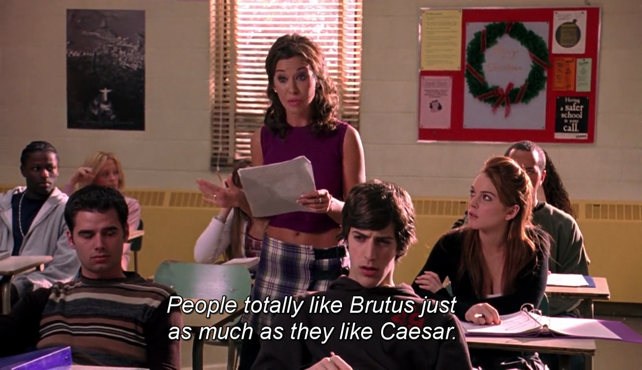Hi everyone, Jorge here. Welcome to the first installment of Blueprints, a new weekly series where we'll discuss the relationship between the pages of a script and the finalized cinematic products. To start things off, an audience-favorite and one of the most quotable films of all time.

Tina Fey’s cult-classic satire on teenage girlhood, cliques, and cheese fries has quickly become an indispensable presence inside the ranks of Most Quotable Films lists. Behind-the-scenes recognition has fallen more on the writer than on director Mark Waters (brother of Heathers’ helmer Daniel Waters; for those keeping tabs on your clique movies). Almost every single line has become a chant for people to drop on each other, so much that Quote-Along screenings of the film have become widely popular.
But what is it about Mean Girls that made it not only memorable, but practically irresistible to mouth along to?
Mean Girls Written by: Tina Fey
Based on: Queen Bees and Wannabes by Rosalind Wiseman
[You can read the full script here. I will be talking about these pages and this scene.]
The script most widely available online (which I’m using as a basis) is a very early draft of the movie. It is dated June 3, 2003; almost a year before the movie opened on April 30, 2004. Some sequences are completely different than the final product. For literal starters, this script opens with Cady sleeping as opposed to her parents sending her off to school:

Some of the most memorable lines are not even on this draft:

***

“Is butter a carb?”, “Her hair is full of secrets….”? They’re not here. Perhaps those lines were improvised on spot or (most likely) added onto future drafts; there’s no way to know for sure.
But let’s focus on a single scene: Gretchen Weiner’s infamous Caesar monologue.
Unlike many other “quotable” moments in the movie, this is not just a clever line of dialogue. This scene is a pivotal turning point for Gretchen. And while we can see that sharper dialogue can be added later, these types of moments have to emerge from the page.
In this scene (which you can read in full above), there is not a lot of description in the action lines. Fey uses words like “elated” and “playfully” to guide the actors, but she isn’t ultra-specific about how they should act; the finished performances are a collaboration between director and actors.
The most explanatory line comes when she writes that “Gretchen’s face twists up in a frighteningly hateful expression.” The fact that the very next scene (after an abrupt CUT TO), starts “With the same hateful expression on her face” is an indication that Fey wanted to emphasize the importance of staying with her. And editor Wendy Greene took up on her cue. The finished transition is a fade through Gretchen’s expression.

Gretchen’s monologue is all in the page. However, there is no indication (except for that very important “hateful” adjective) of how it is to be performed. Fey charges the words with sentiment, but it was up to Lacey Chabert to interpret that sentiment. And that’s when a good piece of writing becomes a quotable piece of writing: when it is put through the filter of a well-aligned performance.
Chabert infuses those ten lines of dialogue with an impressive combination of overflowing and boiling hate, anxiety, and pain. It is never stated in the script, but Movie Gretchen (an evolved version of Script Gretchen) is having a full-on emotional meltdown.
The final scene even has an additional line (“People totally like Brutus just as much as they like Caesar”), which actually says so much about her character; it informs how Gretchen views herself in relation to Regina.

There’s no denying that the script for Mean Girls is an ingenious package of quick-witted dialogue, memorable characters, and a well-layered and structured plot. However, the brilliance of a script will stay buried on a page unless helped by others in the filmmaking process.
So why is Mean Girls one of the most quotable films of all time? Because Tina Fey laid down the words, but every other collaborator in the film (the director, the editor, the actors) lifted them and took them from the page to a fully realized cinematic satire; to an all-time classic that has penetrated popular slang like few others.
And that is so fetch.